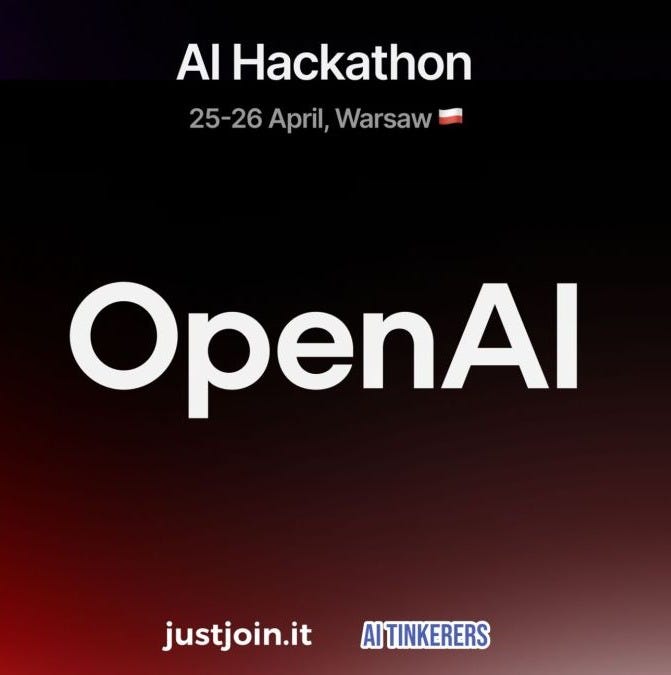How AI Will Disrupt Outsourced Work, Agentic Commerce, How to Be a Solopreneur
Let's hack.
Good morning
Hope you are doing great. I have some fantastic news I want to share.
We’re bringing OpenAI to Warsaw! I want to invite every builder to a hackathon with Artur and Tomek from AI Tinkerers, the OpenAI team, and myself.
The hackathon topic, AI Agents, is around the recent release of new tools for building agents, such as the Responses API, computer use, and the Agents SDK.
Seats will be very limited - please sign up here.
When: 25-26th of April
Where: Just Join IT Office (in-person only)
Feel free to share it with your friends and in some closed groups - start forming the best teams you can! See you there.
Onto this week’s edition.
In today's edition, among other things:
How AI Will Disrupt Outsourced Work
Agentic Commerce
Model Context Protocol
Will AI Kill Writing
How to Be a Solopreneur
DoD Contracting for Startups
User Acquisition Framework
How to Get Indexed on AI Platforms
Onwards!
How AI Will Disrupt Outsourced Work
In traditional B2B SaaS, software made human labor more efficient. Now, AI is outright replacing tasks that once required employees. This shift is leading to what some call the reversal of SaaS: Software-as-a-Service is becoming Service-as-a-Software.
Companies no longer just buy software to assist their teams; they buy AI employees.
The distinction between human labor and software is disappearing.
Entire job functions—sales reps, software engineers, customer service teams—are now being staffed by AI.
The labor market and software market are merging into one.
Here’s a16z on business process outsourcing (BPO):
We believe there is a clear opportunity with AI to productize and unbundle the BPO. This is exciting for several reasons. From a technical perspective, there’s a clear “why now”: modern AI has become exceptionally good at handling work that couldn’t previously be done adequately with software. Core foundation models are rapidly getting better at data extraction, deep research, and complex reasoning, while voice AI agents are mature enough for large-scale production with browser agents soon to follow. From a business perspective, BPOs tend to be older incumbents that lack cutting-edge tech and operate in a well-defined category of work with clear, existing budgets; this makes them prime disruption targets for startups given the proven market need, available budget, and legacy competition.
Historically, software companies enjoyed 80%+ profit margins, while service-based businesses operated at below 30% margins due to labor costs. But as AI services take over human roles, those margins are collapsing into software economics.
This means:
AI-driven businesses will be hyper-profitable compared to legacy service models.
Many traditional service-based industries will become obsolete or radically reshaped.
SaaS incumbents may lose relevance as AI-native services build their own tools, disrupting traditional pay-per-seat models.
AI workforce companies fall into two broad categories:
1. AI Colleagues (Internal Workforce Enhancement)
These AI agents are built to replace specific job roles within an organization.
Devin, the AI Software Engineer from Cognition Labs, writes and debugs code.
Digital SDRs (Sales Development Representatives) work through sales pipelines and book meetings.
AI legal assistants generate contracts, perform due diligence, and replace paralegal work.
The key insight here: Companies will shrink, but their output will grow.
2. AI Vendors (External AI Services)
This category replaces entire businesses rather than individual employees.
AI-powered BPO (Business Process Outsourcing): AI customer service agents replace offshore call centers.
AI-run consulting firms: An AI McKinsey that can handle strategy and financial modeling.
AI real estate brokers, AI wealth managers, AI law firms.
Will AI vendors create net new markets, or will they simply eliminate existing businesses?
Here are the ones attacking the BPO market today:
Agentic Commerce
AI Agents function as computational entities with bounded (and constraint) autonomy to execute complex (?) workflows on behalf of users or organizations. Unlike traditional interfaces that facilitate human decisions, these systems can independently:
Evaluate conditions against predefined parameters
Execute multi-step processes spanning multiple systems
Make contextual decisions based on learned preferences
Complete transactions without continuous user intervention
This trend goes across different verticals, including commerce. Here’s Acrew Capital:
Now, we stand at the brink of a new era in commerce, and anticipate the same dynamic playing out. AI is creating a shift from manual, search-based transactions to more autonomous, intent-driven and personalized transaction experiences. As we saw in prior technology waves, the path of discovery and distribution massively evolved for merchants (ex: SEO and social media as critical gateways). Today, we’re already witnessing the early stages of AI-facilitated discovery through answer engines like Perplexity, ChatGPT, and Claude, which act as intermediaries between consumers and merchants by synthesizing information and providing recommendations, rather than simply displaying an endless feed of links. This represents a fundamental shift in the discovery paradigm. The next frontier of AI includes autonomous agent systems, where LLMs not only respond to queries but proactively direct their own processes, orchestrate multiple tools, and execute complex tasks with minimal intervention.
This emerging commercial framework—which venture investors are now calling "A-Commerce"—introduces an intermediation layer between users and traditional commercial systems. These agents interpret high-level intent and transform it into specific transactional actions.
They could change:
Keep reading with a 7-day free trial
Subscribe to Bartek Pucek to keep reading this post and get 7 days of free access to the full post archives.


